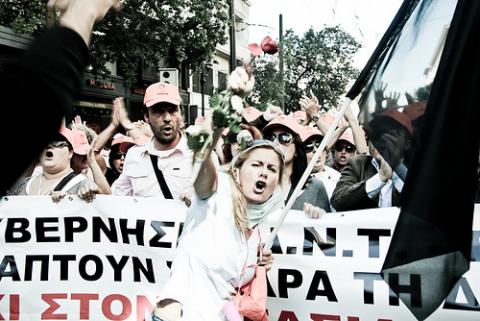The neoliberal assault on democracy

Of course, it is always possible, and very often the case, that the dominant media claims that a “fiscal crisis” has precipitated mass demonstrations, strikes, and new forms of political mobilisation in Greece. Although it is true that there is fiscal crisis, it should not be understood as a periodic difficulty that a country or a region periodically passes through only then to re-enjoy the economic status quo. What is emerging in fast and furious form is a constellation of neoliberal economic practices that are establishing a new paradigm for thinking about the relation between economic and social forms as well as modes of rationality, morality, and subject formation. And the problem, that which pushes tens of thousands of people onto the street, is not simply the rise of technological modes of labour and new ways of calculating the value of work and life. Rather, neoliberalism works through producing dispensable populations; it exposes populations to precarity; it establishes modes of work that presume that labour will always be temporary; it decimates long-standing institutions of social democracy, withdraws social services from those who are most radically unprotected – the poor, the homeless, the undocumented – because the value of social services or economic rights to basic provisions like shelter and food has been replaced by an economic calculus that values only the entrepreneurial capacities of individuals and moralises against all those who are unable to fend for themselves or make capitalism work for them.
So when we ask why so many thousands take to the street in relation to a “fiscal” crisis, it is because they see and oppose an entire economic regime that amasses wealth for the very few at accelerated speeds as it augments the number of those who live in poverty and are exposed to forms of precarity for which no institutional protection still exists. When populations understand themselves as abandoned to conditions of induced precarity, they understand that they are no longer represented by political regimes that are inseparable from neoliberal forms of power and rationality. At this point, the democratic claims of the state are called into question, for who is the “we” who is represented by governments that are themselves driven by, and driving, neoliberal forms of economics that rely on dispensable populations, substitutable labour (through “flexibility” models), abandoned populations excluded from the “we” that is represented by democratic governments and institutions. So when the abandoned assemble and insist that they are still the “we” who democracy must represent, that their dispensability calls into question the claim that any neoliberal government can make to being democratic. If democracy is to have any meaning still, then, it must express the will of the people, and what we see on the ground, in the street, and that noise we hear through the squares, is precisely the reconstitution of the popular will, the bodily gathering and insistence of a people who will not be dispensed with, and through whom we see enacted in microcosm social forms of radical democracy, which include relations of equality and mutual dependency.
The problem is not a fiscal crisis whose bailout will return matters to normal. The problem is that neoliberal forms of political and economic power regularly abandon populations to conditions of precarity, and that this periodic and regular abandoning of people has itself become the normal. As a result, the call on the streets is precisely not to “fix” this fiscal crisis, but to insist that the dismantling of neoliberalism is imperative for the renewal of radical democracy.
Originally published on Critical Legal Thinking under a Creative Commons Attribution-Noncommercial-No Derivative Works 3.0 Unported license.
Image top: Odysseasgr.
